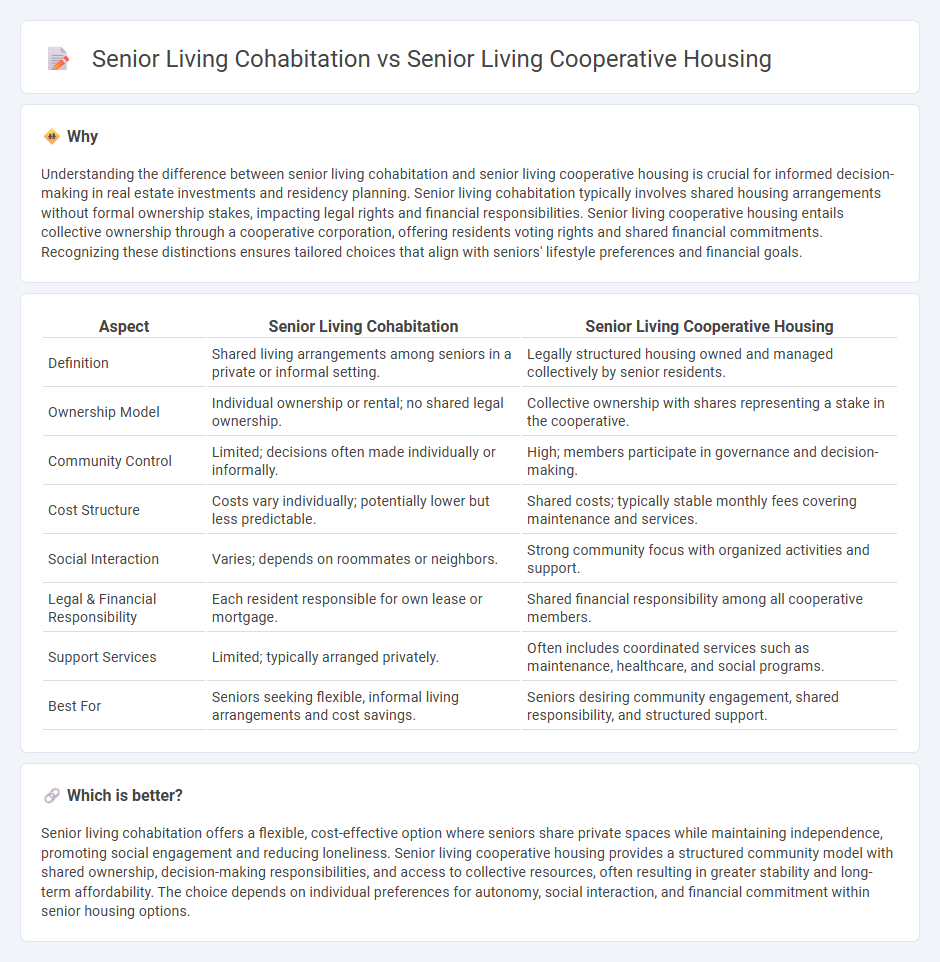
Senior living cohabitation involves seniors sharing a private residence while maintaining individual leases and personal independence, often reducing costs through shared expenses. Senior living cooperative housing is a collectively owned community where residents hold shares in the cooperative corporation, providing control over governance and potentially more affordable long-term housing. Explore the differences to determine the best fit for senior living preferences and financial goals.
Why it is important
Understanding the difference between senior living cohabitation and senior living cooperative housing is crucial for informed decision-making in real estate investments and residency planning. Senior living cohabitation typically involves shared housing arrangements without formal ownership stakes, impacting legal rights and financial responsibilities. Senior living cooperative housing entails collective ownership through a cooperative corporation, offering residents voting rights and shared financial commitments. Recognizing these distinctions ensures tailored choices that align with seniors' lifestyle preferences and financial goals.
Comparison Table
| Aspect | Senior Living Cohabitation | Senior Living Cooperative Housing |
|---|---|---|
| Definition | Shared living arrangements among seniors in a private or informal setting. | Legally structured housing owned and managed collectively by senior residents. |
| Ownership Model | Individual ownership or rental; no shared legal ownership. | Collective ownership with shares representing a stake in the cooperative. |
| Community Control | Limited; decisions often made individually or informally. | High; members participate in governance and decision-making. |
| Cost Structure | Costs vary individually; potentially lower but less predictable. | Shared costs; typically stable monthly fees covering maintenance and services. |
| Social Interaction | Varies; depends on roommates or neighbors. | Strong community focus with organized activities and support. |
| Legal & Financial Responsibility | Each resident responsible for own lease or mortgage. | Shared financial responsibility among all cooperative members. |
| Support Services | Limited; typically arranged privately. | Often includes coordinated services such as maintenance, healthcare, and social programs. |
| Best For | Seniors seeking flexible, informal living arrangements and cost savings. | Seniors desiring community engagement, shared responsibility, and structured support. |
Which is better?
Senior living cohabitation offers a flexible, cost-effective option where seniors share private spaces while maintaining independence, promoting social engagement and reducing loneliness. Senior living cooperative housing provides a structured community model with shared ownership, decision-making responsibilities, and access to collective resources, often resulting in greater stability and long-term affordability. The choice depends on individual preferences for autonomy, social interaction, and financial commitment within senior housing options.
Connection
Senior living cohabitation and senior living cooperative housing both provide community-oriented living solutions designed to enhance social interaction and support among older adults. These models promote shared responsibilities and collective decision-making, which can lead to improved mental health and cost savings for seniors. Integration of these approaches fosters a sense of belonging, security, and accessibility to personalized care within affordable housing options.
Key Terms
**Senior Living Cooperative Housing:**
Senior living cooperative housing offers residents shared ownership of their community, promoting a strong sense of security and mutual support among seniors. This model emphasizes collective decision-making and financial collaboration, often resulting in lower monthly costs compared to traditional senior living arrangements. Explore the benefits and unique features of senior living cooperative housing to see if it aligns with your lifestyle needs.
Share Ownership
Senior living cooperative housing involves residents purchasing shares in a corporation that owns the property, granting them exclusive rights to their living units and a voice in community decisions through a democratic governance model. In contrast, senior living cohabitation typically refers to multiple seniors sharing a residence without formal share ownership or corporate governance, focusing more on communal living and shared expenses rather than legal ownership stakes. Explore more to understand how share ownership impacts community control, financial responsibilities, and resident rights in senior living environments.
Member Governance
Senior living cooperative housing features structured member governance, where residents collectively make decisions on property management, budgets, and community policies through formal voting processes. Senior living cohabitation typically lacks this organized governance, focusing more on shared living arrangements without legal frameworks for member control or decision-making. Explore the differences in governance models and benefits of senior living communities for a deeper understanding.
Source and External Links
Senior Living Cooperatives Explained - Senior living cooperatives offer independence and social interaction for adults 55+, where residents buy shares in the cooperative to own a unit without shouldering all maintenance responsibilities.
Senior Cooperative Foundation - Cooperatively owned senior housing provides full apartment and townhouse living controlled by the seniors themselves, with financial benefits such as tax deductibility and equity return.
Senior Cooperative Housing - Senior cooperative housing communities are nonprofit corporations where residents collectively own the building and land, buying stock to become shareholders with shared responsibilities and amenities.
 dowidth.com
dowidth.com